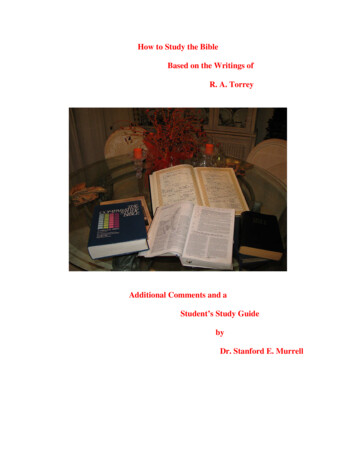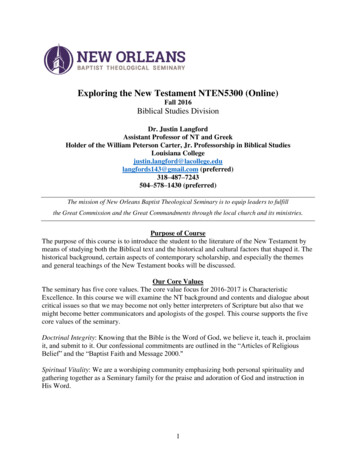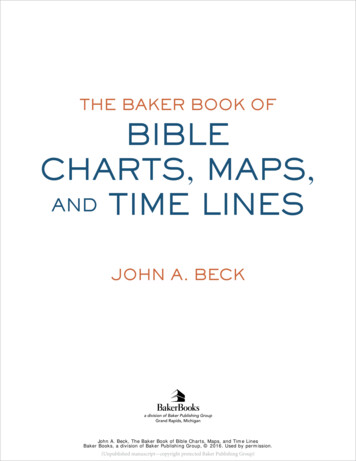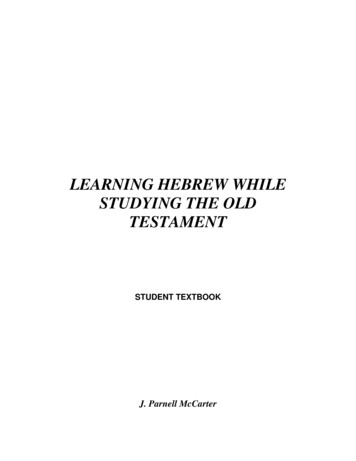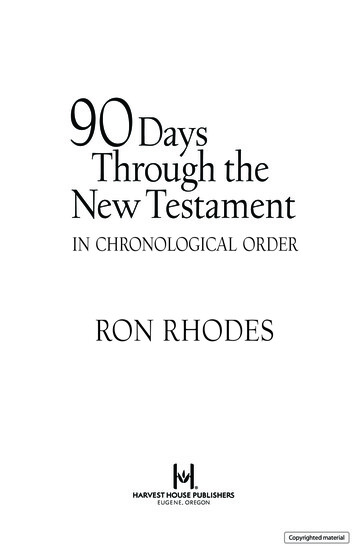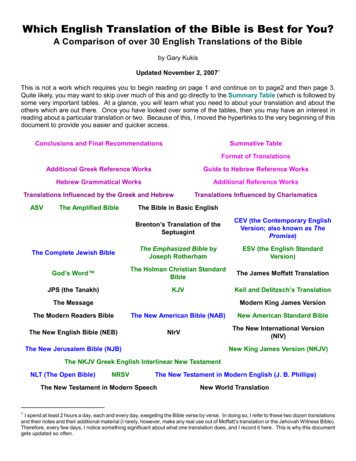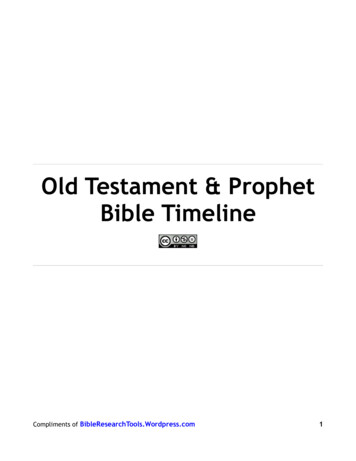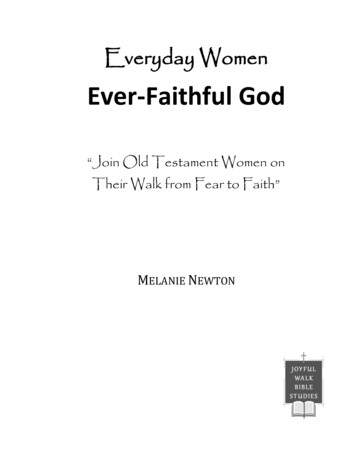
Transcription
Everyday WomenEver-Faithful God“Join Old Testament Women onTheir Walk from Fear to Faith”MELANIE NEWTON
We extend our heartfelt thanks to the many women who served as editors for this study guide—especially Brenda Sharp, Joye Messerli, and Michelle Burns. Without your help, we would neverhave accomplished this monumental task in a timely manner. Thanks also to the Thursdaymorning Bible class from RockPointe Church in Flower Mound whose insights helped me to makeneeded updates to the original study.Copyright 2020 by Melanie NewtonAll rights reserved. Permission is granted to reproduce for personal and group use but not forresale. For questions about the use of this study guide, please visit www.melanienewton.com tocontact us.The cross image on the cover is -5024110.jpg”from www.maxpixel.net. The image of the women is “502019181 univ lss lg.jpg,” a publicdomain image.Published by Joyful Walk Press.Scripture quotations unless otherwise noted are taken from the Holy Bible, NewInternational Version , NIV . Copyright 1973, 1978, 1984 by InternationalBible Society. Used by permission of Zondervan Publishing Company. All rightsreserved.Melanie Newton is the author of “Graceful Beginnings” books for anyone new to the Bible and“Joyful Walk Bible Studies” for established Christians. Her mission is to help women learn to studythe Bible for themselves and to grow their Bible-teaching skills to lead others. For questions aboutthe use of this study guide, please visit melanienewton.com to contact us.Joyful Walk Bible Studies are grace-based studies for women of all ages. Each study guidefollows the inductive method of Bible study (observation, interpretation, application) in a warm andinviting format. We pray that you and your group will find Everyday Women, Ever-Faithful God aresource that God will use to strengthen you in your faith walk with Him.Flower Mound, TX
Melanie NewtonMelanie Newton is a Louisiana girl who made the choice to followJesus while attending LSU. She and her husband Ron married andmoved to Texas for him to attend Dallas Theological Seminary.They stayed in Texas where Ron led a wilderness campingministry for troubled youth for many years. Ron now helpscorporations with their challenging employees and is the author ofthe top-rated business book, No Jerks on the Job.Melanie jumped into raising three Texas-born children and servingin ministry to women at her church. Through the years, the Lordhas given her opportunity to do Bible teaching and to write gracebased Bible studies for women that are now available from herwebsite (melanienewton.com) and on Bible.org. GracefulBeginnings books are for anyone new to the Bible. Joyful WalkBible Studies are for maturing Christians.Melanie is a speaker, author, and trainer with Joyful Walk Ministries. Her mission is to help womenlearn to study the Bible for themselves and to grow their Bible-teaching skills to lead others. Herheart’s desire is to encourage you to have a joyful relationship with Jesus Christ so you are willingto share that experience with others around you.“Jesus took hold of me in 1972, and I’ve been on this great adventure ever since.My life is a gift of God, full of blessings in the midst of difficult challenges. Themore I’ve learned and experienced God’s absolutely amazing grace, the more I’vediscovered my faith walk to be a joyful one. I’m still seeking that joyful walk everyday ”Melanie
Other Bible Studies by Melanie NewtonGraceful Beginnings Series books for new-to-the-Bible Christians:A Fresh Start: Beginning study for new ChristiansPainting the Portrait of Jesus: A study of the Gospel of JohnThe God You Can Know: The character traits of our Father GodGrace Overflowing: Seeing Christ through a survey of Paul’s lettersThe Walk from Fear to Faith: Old Testament womenSatisfied by His Love: New Testament womenSeek the Treasure! EphesiansJoyful Walk Bible Studies for growing Christians:Graceful Living: The essentials of living a grace-based Christian lifeEveryday Women, Ever Faithful God: Old Testament women (also in Spanish, Indonesian)Live Out His Love: New Testament womenHeartbreak to Hope: Good news from MarkRadical Acts: Adventure with the Spirit from the book of ActsThe God-Dependent Woman: Life choices from 2 CorinthiansKnowing Jesus, Knowing Joy: A study of Philippians (also in Spanish)Healthy Living: A study of ColossiansPerspective: A study of 1 and 2 ThessaloniansAdorn Yourself with Godliness: A study of 1 Timothy and Titus (also in Spanish)To Be Found Faithful: A study of 2 TimothyProfiles of Perseverance: Old Testament men (also in Spanish)Reboot, Renew, Rejoice: A study of 1 and 2 ChroniclesConnecting Faith to Life on Planet Earth: A study based on Genesis 1-11Graceful Living Today: A 150-day devotional based on the Graceful Living studyBible Study Leadership CoursesBible Study Leadership Made Easy: Learn to lead with confidence & grace (online course)The 5 C’s of Small Group Leadership: Handbook for small group leadersFind these and more resources for your spiritual growth at melanienewton.com.
CONTENTSUsing This Study Guide . 1Lessons1 The Walk from Fear to Faith . 72 Sarah — A Woman Like Us. 193 Jochebed & Miriam — Influential Women . 294 Rahab — A Past And A Future . 395 Deborah & Jael — Resourceful Women . 496 Naomi & Ruth — Mothers And Daughters . 597 Hannah & Mrs.Manoah — Mothering Challenges . 698 Abigail & Bathsheba — Two Wives. 819 Two Widows — Single with Children . 9110 Woman of Shunem — A Story to Tell . 10311 Esther — Woman of Courage . 11312 Preview Lesson. 123ResourcesSmall Group Discussion Guide . 131Applying Faith To Fear . 143Sources . 145
INTRODUCTIONUsing This Study GuideThis study guide consists of 11 lessons arranged chronologically according to Old Testamenthistory. For those who are not familiar with the history of Israel found in the Old Testament, eachlesson begins with a brief history of a particular time period and then covers the lives of 1-2 womenwho lived during that time.The lessons are divided into 5 sections (about 20 minutes in length). The first 3 sections contain adetail study of the passages. The fourth section asks you to reflect on what you’ve learned. Thelast section is a podcast that provides additional insight to the lesson. If you cannot do the entirelesson one week, please read the Bible passage being covered.The Basic StudyEach lesson includes core questions covering the narrative associated with the lives of 1-2 women.These core questions will take you through the process of inductive Bible study—observation,interpretation, and application. The process is basically answering these questions: What does the passage say? (Observation: what’s actually there)What does it mean? (Interpretation: the author’s intended meaning)How does this apply to me today? (Application: making it personal) Your Life’s Journeyquestions lead you to introspection and application of a specific truth to your life.Study EnhancementsDeeper Discoveries (optional): Embedded within the sections are optional questions for furtherresearch of subjects we don't have time to cover adequately in the lessons or contain informationthat may enhance the basic study. If you are meeting with a small group, your leader may give youthe opportunity to share your "discoveries.”Study Aids: To aid in proper interpretation and application of the study, additional study aids arelocated where appropriate in the lesson: Historical InsightsScriptural InsightsFrom the Hebrew (definitions of Hebrew words)Focus on the MeaningThink About It (thoughtful reflection)Tell Your StoryThis study is about the faith walk of women—those who lived in years past and those who live inthe present. The scripture passages tell each Old Testament woman’s “story” about her trust inGod’s faithfulness and goodness. Through TELL YOUR STORY questions in each lesson, you will beencouraged to write parts of your own story that relate to what’s learned in the lesson. At the endof the study, you’ll have enough information to put together a “My Story” of your own faith walk withGod—especially your walk from fear to faith.PodcastsFind podcasts coordinating with these lessons at melanienewton.com/podcasts (choose “1:Everyday Women, The Walk from Fear to Faith”). Or, follow the links in the PDF version to1
EVERYDAY WOMEN, EVER-FAITHFUL GODaccess the podcast for each lesson. Listen to the first podcast as an introduction to the study.Old Testament SummaryAbout 1700 years after God created everything, He sent judgment on a rebellious race through aworldwide Flood. He later separated the nations with different languages and scattered them fromBabel. Abraham, Isaac, and Jacob were founding fathers of the Hebrew people. Sold into slavery,Joseph became a powerful foreign leader. The Israelites grew in number for 400 years in Egypt.Then God delivered them from bondage through Moses who took the people across the Red Seaand taught them God's Law at Mt. Sinai. Joshua led the Israelites into the Promised Land after a40-year trek in the wilderness because of unbelief.During the transition toward monarchy, there were deliverer-rulers called "Judges," the last of whomwas Samuel. The first three Hebrew kings—Saul, David, and Solomon—each ruled 40 years. UnderRehoboam, the Hebrew nation divided into northern and southern kingdoms, respectively calledIsrael and Judah. Prophets warned against worshipping the foreign god Baal. After the reign of 19wicked kings in the north, Assyria conquered and scattered the northern kingdom. In the south, 20kings ruled for 350 years, until Babylon took the people into captivity for 70 years. Zerubbabel,Ezra, and Nehemiah led the Jews back into Jerusalem over a 100-year period. More than 400"silent years" spanned the gap between Malachi and Matthew.The 39 books in the Old Testament are divided into 4 main categories: “The LAW” (5 books)—the beginning of the nation of Israel as God’s chosen people; Godgiving His Laws to the people that made them distinct from the rest of the nations.“HISTORY” (12 books)—narratives that reveal what happened from the time the peopleentered the Promised Land right after Moses died until 400 years before Christ was born.“POETRY & WISDOM” (5 books)—take place at the same time as the history books butare set apart because they are written as poems and have a lot of wise teaching in them.“PROPHETS” (17 books)—concurrent with the books of history and, except forLamentations, reflect the name of the prophet through whom God spoke to the nation ofIsrael.Old Testament Timeline2Historical PeriodYears B.C.Woman StudiedThe Patriarchs2100 - 1800SarahIsrael in Egypt1800 - 1450Jochebed, MiriamExodus through Conquest of the Land1450 - 1400Miriam, RahabTime of the Judges1400 – 1000 Deborah & JaelNaomi & RuthHannah & Mrs. ManoahUnited Kingdom1000 – 900Abigail & BathshebaDivided Kingdom900 – 722Zarephath Widow & Prophet’s WidowWoman of ShunemCaptivity and Restoration609 – 400Esther
INTRODUCTIONOld Testament Women Walk from Fear to FaithThis study examines the faith walk of women who lived in Old Testament days. Like many womentoday, you may have very little knowledge of the Old Testament. You might look at that half of yourBible and think, “What’s written in it happened so long ago—anywhere from 2-4 thousand yearsago. What do those women have in common with me? They don’t live in my world. They seem justlike names on a page.”If you like to read biographies, doesn’t reading someone’s story make that person come alive foryou? Or, you may have done genealogy work on your family tree. It can be great to find somethingto brag about. But, you can also find out some of your ancestors’ dark secrets and hardships. Idon’t know about you, but I feel a connection to that great-great grandmother when I learn a littlebit about her life. Hopefully, that’s what you will experience through this study.These Old Testament women were EVERYDAY WOMEN, just like we are, with many of the sameexperiences and challenges that we have. We’ll see an EVER-FAITHFUL GOD in action—a faithfulGod whose character never changes. He’s as faithful now in our everyday circumstances of life asHe was years ago to them. We can feel confidence in His presence and active involvement, evenwhen we can’t see it. And, knowing this, we can trust in Him whenever we are afraid. And, we areoften afraid, aren’t we?A few years ago, I heard Jill Briscoe say, “Women are a fear-driven, performance-oriented species.”I think she’s right. Fear is an ever-present emotion with us. Real fears and imagined fears. Is itrealistic to think we can live without fear? No! Fear is a normal human emotion designed by God toalert us to danger so that we will take action against it. Yet, fear can take root in us and cause usto give way to panic and hysteria. God knows this about us. When we are afraid, God wants us totrust Him and not give way to fear. Learning to do so is our WALK FROM FEAR TO FAITH.As we join these Old Testament women on their walk from fear to faith, we will see consistent truthsthat we can apply to our lives today in our faith walk God loves me.God knows what is going on in my life.God can do something about it.I can trust His goodness in whatever He chooses to do!Your walk from fear to faith begins as you count on these truths and live each day believing theyare true.Your faith walk is your story, your biography of God’s faithfulness to you and your response backto Him. Each one of these women had a story, and that story has been shared over and over tomillions of eager listeners. You’re going to get to know it as you get to know them. It’s a connectionwith real women, EVERYDAY WOMEN.And, each one of you has a story. You will be given opportunities throughout the study to recallparts of your story, write about it, and share it with others. And, you’ll have more reason to praiseour EVER-FAITHFUL God as you see and hear how He has been faithful to each of you throughthe years. It’s going to be a great journey. And, I’m so glad to be walking beside you!Melanie Newton3
EVERYDAY WOMEN, EVER-FAITHFUL GODDiscussion Group Guidelines1. Attend consistently whether your lesson is done or not. You’ll learn from the other women,and they want to get to know you.2. Set aside time to work through the study questions. The goal of Bible study is to get to knowJesus. He will change your life.3. Share your insights from your personal study time. As you spend time in the Bible, Jesuswill teach you truth through His Spirit inside you.4. Respect each other’s insights. Listen thoughtfully. Encourage each other as you interact.Refrain from dominating the discussion if you have a tendency to be talkative. 5. Celebrate our unity in Christ. Avoid bringing up controversial subjects such as politics,divisive issues, and denominational differences.6. Maintain confidentiality. Remember that anything shared during the group time is not toleave the group (unless permission is granted by the one sharing).7. Pray for one another as sisters in Christ.8. Get to know the women in your group. Please do not use your small group members forsolicitation purposes for home businesses, though.Enjoy your Joyful Walk Bible Study!4
INTRODUCTIONPODCAST LISTENER GUIDERecommended: Listen to the podcast “Old Testament Women Walk from Fear to Faith” beforedoing this lesson to get some background for the whole study.Old Testament Women Walk from Fear to FaithMany Christians today have very little knowledge of the Old Testament. That might your experience.Do you look at the front half of your Bible and think, “What’s written in it happened so long ago?What do those women have in common with me? They are just names on a page. They didn’t livein my world.” Is that how you feel? Studying Old Testament women is like reading biographies or doing genealogy work onyour family tree. It makes that person come alive for you. It helps you to feel a connectionto that great-great grandmother when you learn a little bit about her life. For some of the Old Testament women we’ll be studying together, their names will befamiliar to you—such as Sarah, Miriam, and Rahab. Others are strangers to you.Old Testament women were everyday women with fears like ours. These Old Testament women were everyday women, just like you and I are, with many ofthe same experiences and challenges that we have. They cooked meals, did laundry, andraised children. They had responsibilities inside and outside of their homes. Some evenhad home businesses. They experienced hormone fluctuations and menopause. Theylaughed with their kids, differed with their mates, and cried when a loved one died. Theywrote songs and played musical instruments. They all found ways to use their 20,000words per day! At one time, they were 20-somethings, then 40-somethings, then 60-somethings andmore. They wore beads, earrings, and bracelets. Their hair needed to be combed andfixed, and it turned grey as they aged. No doubt, some of them, if not all, had somethingon their bodies that sagged. These Old Testament women also experienced fear at various times in their lives just likewe do. They had to face invading enemies, sick husbands and children, and emptypantries. They faced creditors and surprise houseguests. They even had “bad” days whenthings didn’t go right, sometimes due to their own choices. Their stories are just snippets of their biographies and have been preserved for us to getto know them. And through their stories, we get to know their God who is also our God.The Old Testament God is the same ever-faithful God. As we study their lives, we’ll see an EVER-FAITHFUL GOD in action. He’s our faithfulGod whose character never changes.5
EVERYDAY WOMEN, EVER-FAITHFUL GOD He’s as faithful now in our everyday circumstances of life as He was years ago to thosewomen. We can feel confidence in His presence and active involvement, even when wecan’t see it. And, knowing this, we can trust in Him whenever we are afraid.We can trust God with our fears. Fear is an ever-present emotion with us. Real fears and imagined fears. Is it realistic tothink we can live without fear? I don’t think so. Fear is a normal human emotion designed by God to alert us to danger so that we willtake action against it. Yet, sudden fear can cause us to be terrified. God knows this aboutus. The psalmist says in Psalm 56:3-4,“When I am afraid, I will trust in you. In God, whose word I praise, in God I trust; Iwill not be afraid.” When we are afraid, God wants us to trust Him and not give way to fear. Learning to do sois our walk from fear to faith.Sharing your story of walking with your ever-faithful God from fear tofaith. Each of those Old Testament women had a story, and that story has been shared overand over and over to millions of eager listeners. You might be surprised how many timesthe scriptures refer to them actually telling their story in one form or another. You’re goingto get to know it as you get to know them. It’s a connection with real women, everydaywomen. Each one of you has a story. There will be opportunity throughout the study for you torecall parts of your story, write about it, and share it with others. That will give you morereason to praise your ever-faithful God as you see and hear how He has been faithful toeach of you through the years.It’s going to be a gre at journey. And, I ’m so glad to be walking be sideyou!6
LESSON ONE1The Walk from Fear to FaithTime Period: Creation through today“When I am afraid, I will trust in you. In God, whose word I praise, in God I trust; Iwill not be afraid. What can mortal man do to me?” PSALM 56:3-4Day One StudyThe Gift of FearYou know that feeling. The pit in your stomach, pounding of your heart, and rush of your thoughtsas you go from just the possibility of a job loss to starving and being homeless on the streets—allin a matter of seconds. Gripped by fear, although an imagined one.Fear is a normal human emotion designed by God to alert us to danger so that we will take actionagainst it. It has a purpose. It tells us to take precautions, to be wise in our dealings with strangersand strange situations. We need to think of it as a gift.We know fear has a dark side as well. Bible teacher Jill Briscoe has often said, “Women are a feardriven, performance-oriented species.” Just watching the daily news can panic us. What did shemean by fear-driven? Why would fear drive us? And, what does fear drive us to do?Women in general are created with a nesting instinct, a need for security and stability, and a desireto control our environment in order to create that security for us and for those we love. Our Americanway of thinking is this: we can fix it—whatever IT is. When we cannot fix it, we panic. And, fear canbring out the worst in us, especially in our uncertain world rife with the threat of terrorism. Thedamaging effect of constant fear is a disorienting sense that no place is safe.Fear can be real or imagined. For me, a real fear is meeting a snake in my woodsy yard whilegardening. I know they are there so I carefully do everything I can to avoid interaction with them. Iexperienced an imagined fear as my youngest daughter was growing up. That fear manifested itselfin ongoing nightmares about her being kidnapped or molested. She was never threatened that way,but she was friendly and outgoing. I guess I thought she was more vulnerable than my older, morecautious daughter. When that young daughter became a strong teen girl who was daily hockeychecking her older brother into the wall as they met each other in the hallway, those nightmaresstopped. I guess my subconscious recognized that she could handle herself.Is it realistic to think we can live without fear? No! Our faithful God understands this about us. Hedoesn’t want us to stay there, disoriented and hopeless. He gives us the answer—Himself!1. Read Psalm 56:3-4. Write out these verses in the space provided below.2. Reading back over those words you just wrote, underline the phrases that tell you what to dowhen you are afraid. Then, write them below.7
EVERYDAY WOMEN, EVER-FAITHFUL GODNotice that David doesn’t write, “If I am afraid.” He says, “When I am afraid.” Fear will happen. Wecan let fear take root in us so that we give way to panic and hysteria. Does that ring any bells withyou? Are you prone to hysterics? God knows this about us. When we are afraid, God wants us totrust Him and not give way to fear. Learning to do that is your walk from fear to faith.Trusting a Faithful GodSince God understands the tendency to fear and panic in us, the Holy Spirit inspired Peter to writeencouragement and instructions to women in 1 Peter 3:3-6.3. Read 1 Peter 3:3-6. What does God consider of great worth in His sight (verse 4)?Although the context of this passage is a marriage relationship, the principles apply to any woman’scharacter (“inner self”), especially the qualities of a GENTLE and QUIET spirit that are precious inGod’s sight. These enable a woman to “do what is right and not give way to fear” (verse 6). But,you may be thinking, “How can that apply to me? I have a bubbly personality. I’m not naturallyquiet.” Before you start feeling put out about these words or afraid that you could never measureup to this, let’s find out what “gentle” and “quiet” actually mean.Scriptural Insight: “GENTLE” means “controlled strength.” It does not meanpassive, weak, or someone who cannot help herself. Picture a mother cradling anewborn. She has the physical strength to harm that child but doesn’t because herstrength is under control. If you are going to have a gentle spirit, what will you need?Strength under control. A woman with a gentle spirit has a humble heart that bowsitself before God, recognizes God’s dealings with her as good, and chooses not to becontentious or resistant against Him.“QUIET” means “tranquility arising from within.” It does not mean whisper, silent, orbland. “Quiet” includes the idea of causing no disturbance to others. Think how awoman’s hysterics affect those around her—family, friends, and coworkers. A womanwith a quiet spirit has an inner peace and calmness in the midst of any circumstances.We can have a tranquil spirit in the midst of chaos. See how it fits with the “strengthunder control” attitude?Gentleness and peace are fruits of the Holy Spirit (Gal. 5: 22-23) in a believer’s life and availableto every Christian woman who desires them—that includes you and me! Now that you know thereal meanings of these words, are you more likely to desire these qualities?4. Why do you think these qualities in a woman would be so precious – of great worth – to God?8
LESSON ONE5. Read 1 Peter 3:5-6 written below and underline the three choices women can make, identifiedby (1), (2), and (3).“For this is the way the holy women of the past who (1) put their hope in God usedto make themselves beautiful. They were submissive to their own husbands, likeSarah, who obeyed Abraham and called him her master. You are her daughters ifyou (2) do what is right and (3) do not give way to fear.”Peter identifies these examples for us as “holy women of the past.” The word “holy” means setapart for God’s special use. These women are holy because they’ve learned to trust in God whenthey were afraid. As holy women, these women were beautiful in God’s eyes (regardless of theiroutward appearance, age or social status). This beauty attributed to them by God Himself wasbased on three choices they made (“used to make themselves beautiful”) that every woman canmake today: Choice #1: You can put your hope in God—in God and His Word rather than thefickleness of ourselves or others. Choice #2: You can do what is right—according to God’s way of approaching life, not theworld’s way, especially those cultural practices that go against God’s Word. Choice #3: You can choose to not give way to fear. Let’s examine this one more closely.Choose to Not Give Way to FearWhat does that mean—not give way to fear? We know this: God is not saying, “Don’t ever feelfear.” God gave us the gift of fear as a normal human emotion designed to alert us to danger so wecan take action against it. God is saying, “You don’t have to stay terrified and paralyzed by yourfear.” We are to TRUST GOD—in whom we have put our hope and by whose Word we are taughtto do what is right.6. Have you ever felt terrified? How did you respond?7. God says that having a gentle and quiet inner spirit will make it easier for us to not get soterrified and stay that way. What’s harder for God: rescuing us from desperate circumstancesor developing in us a gentle and quiet spirit? Why?Did you select the “developing in us a gentle and quiet spirit?” I agree because it involves ourcooperation! Is it too difficult for Him? No! But here’s the key: a humble, peaceful heart makes iteasier for us to make that choice to trust in the faithfulness of God rather than the fickleness ofourselves or others when we are tempted to panic and succumb to hysteria.9
EVERYDAY WOMEN, EVER-FAITHFUL GODWe have a faithful God. That’s not imaginary. In 1 Peter 3:5, Sarah represents several othereveryday women who lived in Old Testament days who put their hope in God and found Him worthyof their trust. This was their walk from fear to faith. What is that? We’ll find out in the Day Two Study.Think About It: “When we experience anxiety or fear, the enemy can try to use it asan opportunity to make us feel guilt or shame. That’s when we pause and ask God forhelp, knowing He understands and never condemns us.” (Holley Gerth, “Fear Not,”Homelife Magazine, March 2016)8. Your Life’s Journey: What might be holding you back from trusting God whenever you areafraid?Day Two StudyThe Walk from Fear to FaithIn the Bible, “walk” refers to following a certain course of life or conducting oneself in a certain way.It’s your daily life. How you choose to live daily. What motivates you. What guides you. Whatdecisions you make in how you will respond to life. Will your daily walk (life) follow God’s way ofapproaching life or the world’s way of approaching life (usually very different)? Your walk is yourchoice.For the purposes of this study, your choice will involve moving away from fear and toward faith.Most of us have a pretty good understanding of fear in our lives. But, what is faith? God definesthat for us Himself through the writer of Hebrews.9. Read Hebrews 11:1 and 6. What is faith (v. 1)? What must you believe about God in your faith (v. 6)?Did you notice that faith is related to confidence? Confident hope and assurance that what webelieve is true. Confidence that our God exists and is good to anyone who seeks Him. Thisconfidence pleases Him. Hebrews 11 continues to relate the lives of men and women who had thisconfidence in God.10. Re
Old Testament Women Walk from Fear to Faith This study examines the faith walk of women who lived in Old Testament days. Like many women today, you may have very little knowledge of the Old Testament. You might look at that half of your Bible and think, “What’s written in it h
